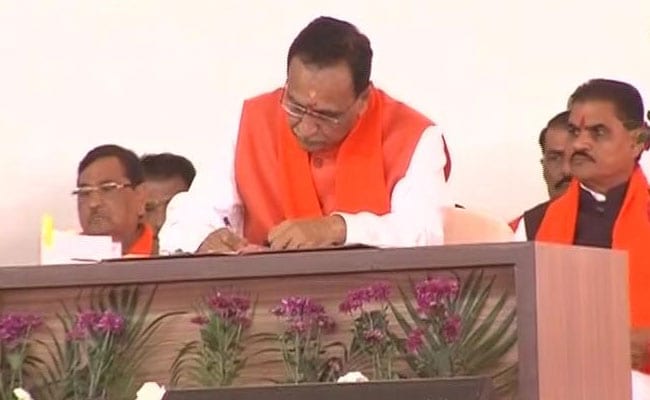
Vijay Rupani took oath as the Chief Minister of Gujarat this morning for a second consecutive term after the BJP won the assembly elections in the state. His deputy and 18 ministers were also sworn in at a well-attended ceremony in Gandhinagar. The presence of Prime Minister Narendra Modi, party chief Amit Shah and all chief ministers of the BJP-ruled states ensured a big show of strength by the ruling party. The BJP stuck to the duo despite a lower margin of victory in Gujarat in the assembly elections. Mr Rupani is seen as an acceptable face of the party and under his leadership, the BJP has done well, especially in his home district constituencies, sources said.
Here is a 10-point recap on the new Gujarat chief minister:
The BJP won Gujarat for the sixth straight term, however, by a lower margin of victory than last time. After the results, Vijay Rupani, 61, had said that the people of Gujarat had rejected the "divisive and casteist politics" of the Congress and voted for the BJP's development model.
Vijay Rupani, who was appointed as the Chief Minister last year, after Anandiben Patel resigned from the post, was selected for a second innings by the newly elected legislators who met under the central observer team, which comprised Finance Minister Arun Jaitley, last week at the Gujarat BJP headquarters.
There were other faces in the fray for the coveted post but they were not considered keeping in mind the ongoing works and the 2019 general elections, party insiders said. Mr Rupani's credentials as a caste-neutral leader with a clean image gave him the edge over others.
Mr Rupani retained his Rajkot West seat against Congress' Indranil Rajyaguru -- the richest candidate in the fray -- by over 21,000 votes. While Mr Rupani bagged 52,155 votes, Mr Rajyaguru got 29,938 votes. Rajkot West is a prestige seat for the BJP. Prime Minister Narendra Modi contested his first-ever election from this constituency and won. Rajkot is also the financial nerve-centre of the Saurashtra region and Mr Rupani wields considerable influence in the region.
In Gujarat, where exit polls had predicted a BJP government, Mr Rupani has said that the party would exceed these forecasts and win 150 seats. However, after Gujarat election results on Monday, his critics said he failed to deliver as the BJP's victory margin over the Congress considerably lowered in this election. The BJP won 99 seats in the 182-member assembly, just seven more than the majority mark of 92 and 16 seats less than it had in 2012.
Born on August 2, 1956 in Rangoon (now in Myanmar), Mr Rupani made his political debut as Rajkot Mayor in 1987. He has been an active worker of the Rashtriya Swayamsevak Sangh (RSS) and the BJP since its inception. He went to jail during the Emergency. He grew up in Rajkot and pursued BA and later LLB.
He became the state chief of the BJP in February 2016 replacing RC Faldu. His selection was seen as a victory for the Amit Shah faction in state BJP.
He was the transport minister in the Anandiben Patel government. As the chairman of the state tourism corporation, he headed 'Khushbu Gujarat Ki' campaign to promote the state as a tourist destination.
In August, 2016, he succeeded Anandiben Patel as the Chief Minister of the high-profile state. Ms Patel was accused of mishandling two large uprisings in the state - the Patel or Patidar agitation and the Dalit anger over a brutal assault on four young men by cow vigilantes - and was also blamed for a setback in civic elections.
His elevation to the top post was seen as a recognition of his Jain community, which was accorded minority status by the state government.

